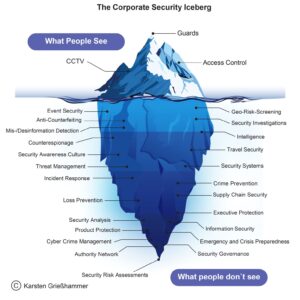In today’s hyperconnected and unpredictable global environment, corporate success is no longer driven by operations, marketing, and innovation alone. One element is often underestimated until it’s too late: security. Security is no longer just about locks, cameras, and badges (or guards, gates, and guns)—it’s a critical function that directly impacts your brand reputation, operational continuity, employee safety, and the organizational bottom line.
At Premier Risk Solutions LLC, we believe that security is not a support function—it’s a strategic one. Here’s why forward-thinking companies must embed security into the fabric of their corporate strategy.

1. The Threat Landscape Is Evolving
Gone are the days when security threats were limited to burglary or physical trespassing. Today’s organizations face multi-dimensional risks, including:
- Cyberattacks and ransomware
- Insider threats
- Corporate espionage
- Executive targeting and harassment
- Workplace violence
- Crisis events such as pandemics, natural disasters, or geopolitical unrest
Each of these can cause significant financial, legal, and reputational damage. Security must now be anticipatory—not reactive—and that requires strategic placement at the leadership table.
A recent report by IBM showed that the average cost of a data breach in the U.S. exceeds $5 million. Yet many companies still treat security as an afterthought, addressing threats only after a breach or incident occurs.
2. Security Aligns with Enterprise Risk Management
Every company has risk on the radar—whether it’s financial, legal, operational, or reputational. Security intersects all these domains. If an executive is targeted abroad, or if a protest breaks out at a facility, how fast your team can respond depends on the level of preparedness embedded into your core operations.
When security is siloed from business strategy, risk management becomes fragmented. When it is integrated, your organization can build a resilient, agile framework capable of addressing both expected and unforeseen disruptions.
3. Protecting People = Protecting Performance
Your employees are your most valuable asset—and they’re also the most vulnerable during times of crisis. From workplace violence to executive protection during international travel, proactive security measures ensure that your team feels safe, supported, and focused.
Incorporating security into corporate strategy sends a message: “We take your safety seriously.” That enhances morale, retention, and your ability to attract high-caliber talent. It also reduces liability exposure in the event of an incident.
4. Investor Confidence and Board Expectations
Today’s investors and board members expect organizations to have robust, demonstrable plans in place for risk mitigation. Whether it’s cybersecurity, executive safety, or supply chain security, stakeholders want to know: What are you doing to prevent disruptions?
A company that integrates security into its strategic framework is better positioned to earn investor trust, secure funding, and weather periods of instability with minimal impact.
5. Reputation Management in the Age of Instant News
In the digital age, one poorly handled security incident can go viral and cause long-term brand damage. From data leaks to on-site incidents, how your company responds and communicates during a crisis can determine whether customers stay loyal or walk away.
When security is part of strategic planning, crisis communication protocols are already in place. Response teams are trained. Executives are briefed. And most importantly, the organization can respond swiftly, calmly, and with control—a key differentiator in moments of public scrutiny.
6. Security Adds Value—Not Just Cost
Too often, security is seen as a cost center. But when aligned with strategy, it becomes a value driver. Consider these examples:
- A well-designed executive protection program allows leaders to focus on growth without distraction.
- Threat assessments and travel security planning help your team expand into new markets safely.
- Business continuity plans reduce downtime after natural disasters or supply chain disruptions.
Smart security investments pay dividends by preventing losses, safeguarding innovation, and maintaining customer trust.

Final Thoughts: Strategic Security Is Smart Business
Security is no longer just a department—it’s a business function that touches every level of an organization. From the C-suite to the front lines, your people, assets, and operations deserve strategic protection that scales with your goals.
At Premier Risk Solutions LLC, we partner with organizations to design and implement security solutions that are proactive, professional, and aligned with your business objectives. Whether you need executive protection, threat intelligence, or a full-scale risk assessment, we’re ready to help you turn security into a competitive advantage.
Is your security strategy where it needs to be? Let’s talk.

